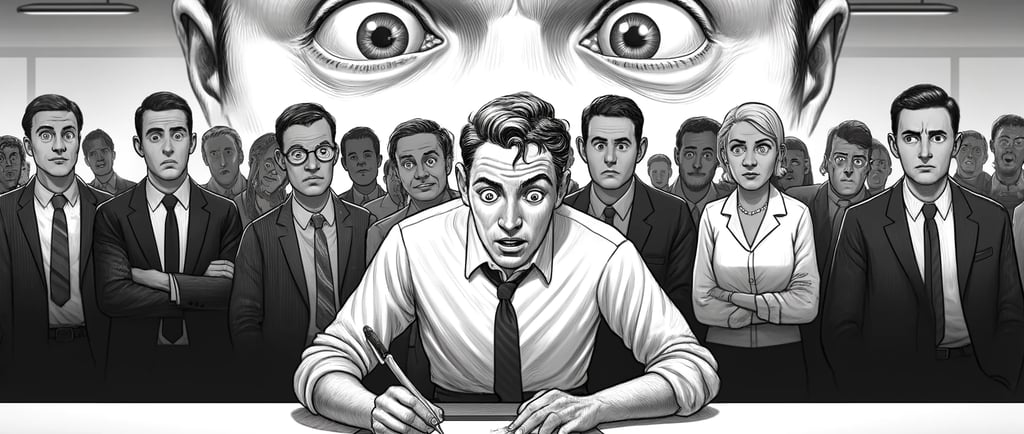Will generative AI squeeze out 'heads-down' work?
In this article I delve into how AI tools are reshaping workplace dynamics, the undervalued importance of heads-down time, and the irreplaceable value of human expertise amidst technological advancements
UXDESIGNCORPORATIONSCULTURE
Jared Lukes
4/10/20243 min read


Tides of Collaboration and Solitude in the Era of Generative AI
Are you like me? Do you get a cold sweat when you have to handwrite on the whiteboard in front of colleges? I don't want to have to talk about my dyslexia or reveal what 20 years of keyboarding has done to my penmanship. But things are changing at work, and the rapid advancement of generative AI tools is writing a new chapter in work culture faster than we can perceive it. This transition sparks a compelling debate about the balance between collaborative and individual work. As we inch closer to a future dominated by AI, it's imperative to examine the shifting dynamics and consider the underlying value of heads-down time—a period of deep, undistracted focus.
From Solitude to Synergy
Historically, the trajectory of many careers has moved from solitary execution to roles requiring greater collaboration. This transition is partly due to climbing the hierarchical ladder, where understanding and coordinating the moving parts becomes crucial. However, the advent of remote work and generative AI is questioning the necessity of solitary work. Will the increase in collaborative tools and AI's capacity to take over substantial portions of manual labor diminish the value of working alone?
The Essence of 'Heads-Down' Time
In the traditional work environment, autonomy between meetings is a given. This time, often referred to as heads-down time, is not just for administrative tasks but for the intricate, creative processes that require undivided attention. For designers, researchers, and many other professionals, this period is when the magic happens—away from the distractions of constant feedback and collaborative sessions. It's a time for meticulous adjustments and deep thought, elements crucial for innovation but often undervalued in highly collaborative settings.
Generative AI: A Double-Edged Sword?
The introduction of generative AI tools into the workplace has been nothing short of revolutionary. Capable of automating a wide range of tasks, from data synthesis to content creation, these tools promise efficiency but also raise concerns. With AI handling tasks that once required hours of focused effort, the boundary between individual and collaborative work blurs. The concern arises: will the reliance on AI erode the sanctity of solitary work, pushing us toward a future where collaboration overshadows deep, individual thought? But as a researcher, I am deeply concerned because while quantitative value is important I can not understate that often while droning out in a session with a test subject I will be jolted to life by an unexpected phrase of words that unlocks an entire theory of research for the product. Will AI hear/see that phrase and understand its value? Very, very unlikely, especially if it's an edge case.
The Social Dynamics of Work Culture
The workplace is not just a physical or digital space where tasks are completed; it's a social environment influenced by dynamics of power, appearance, and communication. In many cases, the loudest or most visually appealing individuals command attention, regardless of their contributions' quality. As generative AI democratizes access to information and efficiency, there's a risk that these superficial traits may gain even more influence, overshadowing the true value brought by those who excel in the quiet, intensive work behind the scenes. TLDR: if you ugly you better be smart AF.
Preserving the Value of the Expert
Despite AI's prowess, the necessity for expertise, especially in handling edge cases and innovative projects, remains unchanged. AI tools, while powerful, falter at the fringes of knowledge and creativity. They excel in the middle ground but lack the nuance and insight that human experts bring to complex, unprecedented challenges. This highlights the enduring value of the expert, the individual who navigates the peripheries of what's known and possible, leveraging AI not as a crutch but as a tool among many.
Finding Balance in the AI Era
As the work landscape evolves due to generative AI, it's crucial to advocate for a balanced approach that values both collaboration and solitude. Recognizing the unique contributions of heads-down work, ensuring that work cultures don't marginalize those who excel in solitude, and leveraging AI as an augmentative tool rather than a replacement for human ingenuity will be key. In navigating these shifts, the goal should be to enhance, not diminish, the richness of human creativity and collaboration. if you think you're being handed a handful of AI BS, ask your contributor to transpose the work in front of you.
